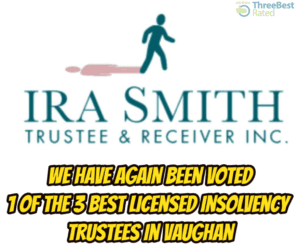 Full disclosure: Ira Smith Trustee & Receiver Inc. is a licensed insolvency trustee firm in Vaughan (Toronto) Ontario. It is not an income tax advisory firm and does not provide income tax services. The information contained here is merely my opinion on SMALL BUSINESS CANADA TAX issues. This blog must not be relied upon for income tax advice or replace the advice of your income tax professional.
Full disclosure: Ira Smith Trustee & Receiver Inc. is a licensed insolvency trustee firm in Vaughan (Toronto) Ontario. It is not an income tax advisory firm and does not provide income tax services. The information contained here is merely my opinion on SMALL BUSINESS CANADA TAX issues. This blog must not be relied upon for income tax advice or replace the advice of your income tax professional.
We are trying something new. At the bottom is an audiogram of this Brandon’s blog. If you would prefer to listen to it, and not read it, scroll down to the bottom and press on the play button. Let us know what you think by sending us a message in the Question box below.
Small business Canada tax: Introduction
In December 2017, our Federal Minister of Finance, Bill Morneau, disclosed some new policies he and Prime Minister Justin Trudeau were thinking about. The changes Finance Minister Morneau was touting, were for toughening up the small business Canada tax scheme. It would have affected entrepreneur’s businesses, their taxes, and their households.
The main aspect of small business Canada tax that our federal government wanted to attack was the age-old concept of family business income splitting. Its more modern name that you would have seen a lot in the press is called income sprinkling. The federal government was trying to advance the theory that small business owners whose family members were shareholders in the business, but not necessarily working in the business, were somehow cheating on their taxes.
Small business Canada tax: The Federal Government’s discussion points
The discussion focussed mainly on professionals, such as doctors, lawyers, and accountants who had a professional corporation. The government was trying to advance the argument how unfair it was for a professional earning say $250,000 annually, to “sprinkle” some of the income among family members older than 18 as compared to a salaried employee earning the same total amount in salary. I find it interesting that they used a quarter of a million dollars annually as an example, and not a lesser number. Do you think that was picked on purpose to subtly portray all family business owners as being fat cats?
The government’s position was that income that might have been paid to only the manager of the business, could be redirected to other family members by way of dividends. If those family members were in a lower-income tax bracket, then they would pay less tax. The government felt that was unfair.
Small business Canada tax: How income splitting or income sprinkling works
First, in order for this to work for a professional, the laws of the Province you live in has to allow you to have household members that aren’t professionals be shareholders of your professional firm. Second, if your spouse has a high taxable income already, then you will not profit by including him or her as an owner of the business. Lastly, you must decide if you’re going to add your children more than 18 years of age, as shareholders.
Assuming you’ve marked off all those issues, it can make a difference to your family’s overall income tax bill to add your partner and/or your grown-up kids as shareholders of your business. By doing this, you can choose to distribute dividends from the business and take advantage of their lower-income tax bracket.
Paying your partner or kids a salary is not as effective as making them shareholders of the firm and paying dividends. If you pay a salary, it needs to be a sensible one, for work that you can actually prove to the Canada Revenue Agency (CRA). In other words, you cannot simply pay your partner $100,000 for doing bookkeeping for the firm. CRA will certainly allow an affordable wage for that function, but it would have to be justified by comparison to the marketplace for such services.
The advantage of paying dividends to family members is that you do not need to prove it. The other benefit of paying dividends is that your firm recovers some of the business tax you’ve paid on dividends made by the firm’s financial investment portfolio. Refundable Dividend Tax on Hand (RDTOH) is the issue. Our firm does not do tax work. This is a complex topic, I will leave it up to you to research how RDTOH works.
Small business Canada tax: Tax changes effective January 1, 2018
Beginning January 1, 2018, the government changed the rules specifically to target professionals who have incorporated (specifically, doctors, lawyers, and accountants). Professionals who are gaining from reduced tax rates on what would have otherwise been fully taxed earnings at the highest marginal personal income tax rates, if not for their company.
The government is saying that these incorporate professionals aren’t adding their fair share to Canadian society by their decision to have a professional corporation. For that reason, they should not gain from the tax advantages of doing so.
So what are the changes? The Tax on Split Income (TOSI) rules has been amended to cover grown-up shareholders of private firms. Previously, TOSI rules only applied to minor children. The issue now becomes: If you’re a private company owner and pay dividends to adult family member shareholders, when can you do so without invoking the new regulations? Essentially, you need to be able to show much involvement in business.
Small business Canada tax: Clear bright line
The Federal government is putting what they’re calling a “clear bright-line”’ to exclude some relatives from the TOSI rules. The general TOSI exclusions are:
- The company owner’s spouse, providing they more than 65 years old.
- Children over 18 years old who have made a real labour contribution to the business. CRA is gauging this as an average of 20 hours a week during the year. Alternatively, there is also a test throughout any of the 5 earlier years.
The government has taken direct aim at professional corporations though. These exclusions do not apply where 90% + of the income of the corporation comes from the provision of services. Income from ownership of related businesses that earn income from the provision of services is also included in the calculation.
Inserting a trust into the ownership equation may get around this “excluded shares” provision. You need the advice of your income tax advisor to decide if it would be beneficial to you.
Small business Canada tax: Ottawa punishing small business Canada
When the federal government presented new tax rules, local business claimed they were being unjustly targeted by “punishing” measures. According to Small Business Association Canada, up to fifty percent of the country’s entrepreneurs state they’re feeling negative results.
The federal government also added changes to the passive income rules for private corporations. In the February 2018 Federal Budget, the Liberals added a grind-down mechanism for the small business tax deduction through which every dollar of investment income over $50,000 cuts profits eligible for the small business tax deduction by $5.
This has been especially challenging for organizations that use passive earnings to help in special capital funding. For example, paying for building and construction equipment or to acquire real estate used by the business.
Small business Canada tax: The greatest tax battle in decades isn’t over
The Canadian Federation of Independent Business (CFIB) has asked the Provinces not to follow the Federal Liberals but to support small business.
For small businesses, the greatest tax battle in decades isn’t over. Private corporations who use responsible budgeting techniques and save up their profits and invest them to earn income, to be prepared for a rainy day, are being attacked. They may be saving to smooth out cash flow problems, or they might have a big upcoming purchase. Now they are being attacked through the income tax system for earning investment income in excess of $50K annually. It is clear that CRA will be looking closely at professional corporations’ income tax returns. I would not be surprised to see more CRA audits performed. The Federal government is looking to extract more income tax revenue from private corporations.
The rules are increasingly complex. Entrepreneurs will be spending more time dealing with more punitive income tax rules and income tax audits. All of this is designed by Ottawa for private corporations to pay more income tax. It ignores the investments small business makes. Creating jobs and making capital investments allows small business to contribute in many ways to the Canadian economy. This is aside from paying income tax.
Small business Canada tax: Does your company have too much debt?
Is your company under attack because of tax obligations or for other reasons. Is your company in need of restructuring to get debt relief?
The Ira Smith Team has decades and generations of experience people and companies in financial trouble. If your company is in need of a corporate restructuring proposal debt settlement plan, we have the experience to end your stress and pain and return you and your company to a healthy productive pain-free condition.
Our approach for each case is to develop a solution where Starting Over, Starting Now happens. This starts the moment you meet with us. You’re simply one call away from taking the necessary actions to return to leading a healthy and well-balanced problem-free life. Call us today for your free appointment.
Full disclosure: Ira Smith Trustee & Receiver Inc. is a licensed insolvency trustee firm in Vaughan (Toronto) Ontario. It is not an income tax advisory firm and does not provide income tax services. The information contained here is merely my opinion. This blog should not be relied upon for income tax advice or replace the advice of your income tax professional.
